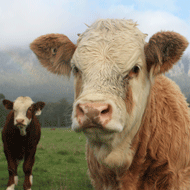New vaccine method could save millions

In the past, BTV outbreaks have been able to spread for up to two years before a new vaccine could be developed.
Glasgow scientists have found a faster way to produce vaccines for new strains of Bluetongue. The breakthrough could save the European economy millions by preventing the virus' devastating spread.
Bluetongue virus (BTV) has caused the deaths of thousands of livestock animals globally. It is spread by a certain type of midge and affects cattle, sheep and some other wild ruminants.
The outbreak of BTV-8 in 2008 is thought to have cost the Dutch economy around €80 million.
Traditionally, methods of prevention include culling of animals or the use of inactivated vaccines, which contain viruses killed by chemical methods.
While these vaccines have been a key tool in outbreaks across Europe over the past decade, they only prevent one strain of BTV. There are at least 26 different serotypes and when a new strain of the virus emerges, a new vaccine is usually required. In the past, BTV outbreaks have been able to spread for up to two years before a new vaccine could be developed.
Researchers from the University of Glasgow and Merial Animal Health have come up with a novel solution to the problem, which cuts design and production time by six months.
In the Journal of Virology, scientists explain how they have applied a "synthetic biology" approach, whereby synthetic viral particles are created in the laboratory. As the vaccine is not dependent on live, infectious viruses, it may be safer than current vaccines.
Lead researcher Massimo Palmarini, who is director of Glasgow's Centre for Virus Research, said: "Our findings demonstrate a clear advantage for the use of synthetic vaccine technology when compared with more traditional options.
"Overall, this vaccine platform can significantly reduce the time taken from the identification of newly emerging BTV strains to the development and production of new effective vaccines.
"They can be brought to the market more quickly but with the same level of quality and reliability as traditional vaccines. This is a big step towards a more sustainable, effective and rapid method of disease prevention."



 HMRC has invited feedback to its communications regarding the employment status of locum vets and vet nurses.
HMRC has invited feedback to its communications regarding the employment status of locum vets and vet nurses.